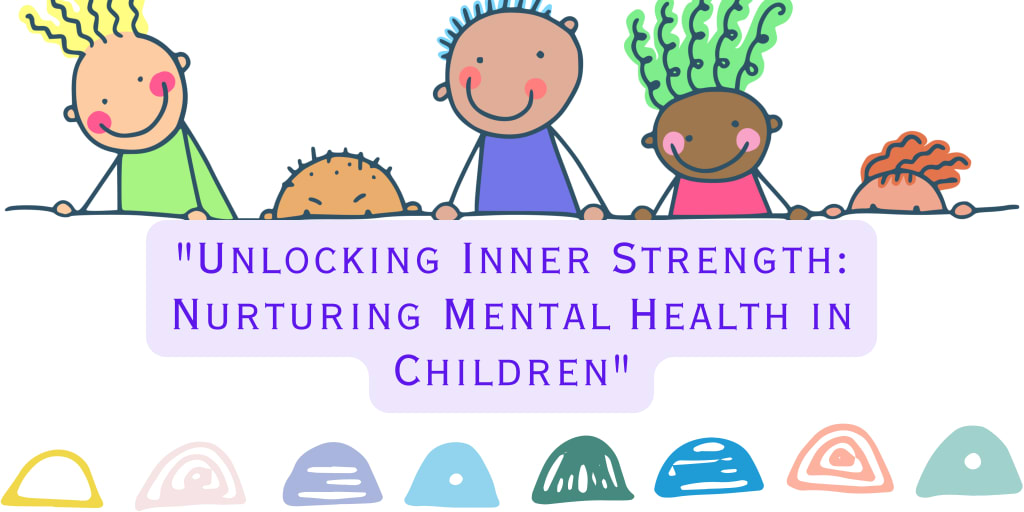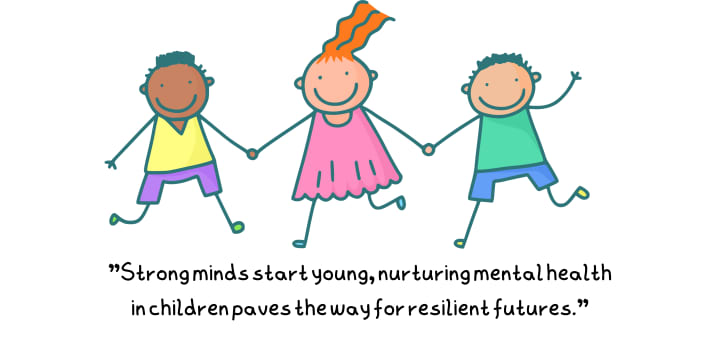Nurturing Mental Health in Children
Unlocking the child's inner strength

Once upon a time, in a cozy neighborhood, there lived a 10-year-old girl named Mia. Mia was a bright and talented young girl, but lately, she had been feeling down about her appearance. She believed that she wasn't pretty enough and that her looks made her different from her peers.
Concerned about Mia's emotional well-being, her parents, Sarah and John, decided to seek help. They reached out to a child therapist, Dr. Michelle, who specialized in working with children facing self-esteem and body image issues.
During their initial session, Mia hesitantly shared her insecurities and her feelings of sadness. Dr. Michelle listened attentively, offering a compassionate and non-judgmental space for Mia to express herself.
Recognizing the importance of building Mia's self-confidence, Dr. Michelle employed various therapeutic techniques. She engaged Mia in creative activities, such as drawing and collaging, to explore her unique qualities and strengths beyond physical appearance.
Dr. Michelle also introduced Mia to positive affirmations, encouraging her to focus on her inner beauty, kindness, and talents. Through guided exercises, Mia gradually started to shift her perspective, understanding that true beauty comes from within.
Understanding the crucial role of parental support, Dr. Michelle involved Sarah and John in Mia's therapy sessions. They learned how to foster a nurturing environment at home, emphasizing the value of inner qualities and providing unconditional love and acceptance.
Sarah and John actively participated in Mia's journey, reinforcing positive self-talk, and celebrating her achievements. They learned to appreciate Mia's individuality and uniqueness, encouraging her to embrace her own identity.
As Mia's therapy sessions progressed, she began to gain confidence and see herself in a more positive light. She realized that her worth was not defined by her external appearance but by her kindness, intelligence, and creativity.
With time, Mia's smile returned, and her self-esteem blossomed. Her parents, grateful for Dr. Michelle's guidance, witnessed their daughter's transformation and the restoration of her vibrant spirit.
This heartwarming story reminds us of the power of seeking professional help and the impact of parental support in a child's emotional well-being. By addressing Mia's concerns with empathy and guidance from a child therapist, her parents helped her navigate through her struggles, ultimately empowering her to embrace her true beauty and uniqueness.
1. Active Listening
Dr. Michelle practiced active listening, providing Mia with a safe space to express her feelings of sadness and insecurity. This technique helped Mia feel heard and validated, building trust in the therapeutic process.
2. Creative Activities
Dr. Michelle engaged Mia in creative activities such as drawing and collaging. These activities allowed Mia to explore her unique qualities beyond physical appearance and encouraged self-expression and reflection.
3. Positive Affirmations
Dr. Michelle introduced Mia to positive affirmations, guiding her to focus on her inner qualities, kindness, and talents. This technique helped shift Mia's perspective towards recognizing her intrinsic worth and building a more positive self-image.
4. Parental Involvement
Recognizing the importance of parental support, Dr. Michelle involved Mia's parents in therapy sessions. Sarah and John learned how to foster a nurturing environment at home, reinforcing positive self-talk, and providing unconditional love and acceptance.
5. Cognitive Restructuring
Dr. Michelle guided Mia in challenging negative thoughts and beliefs about her appearance. Through cognitive restructuring, Mia gradually replaced negative self-perceptions with more positive and realistic thoughts, contributing to improved self-esteem.
6. Psychoeducation
Dr. Michelle provided education to Mia and her parents about self-esteem, body image, and the impact of societal influences. This helped them understand the broader context of Mia's struggles and develop strategies to navigate them.
By combining these therapy techniques, Mia's therapist addressed her concerns, nurtured her self-esteem, and helped her develop a healthier perception of herself. The involvement of Mia's parents played a crucial role in providing ongoing support and reinforcement outside of therapy sessions.

About the Creator
Chinnalakshmi Radhakrishnan
Hello,
I'm a certified child counsellor. I am here to share stories on how taking care of mental health is important for young children.






Comments
There are no comments for this story
Be the first to respond and start the conversation.